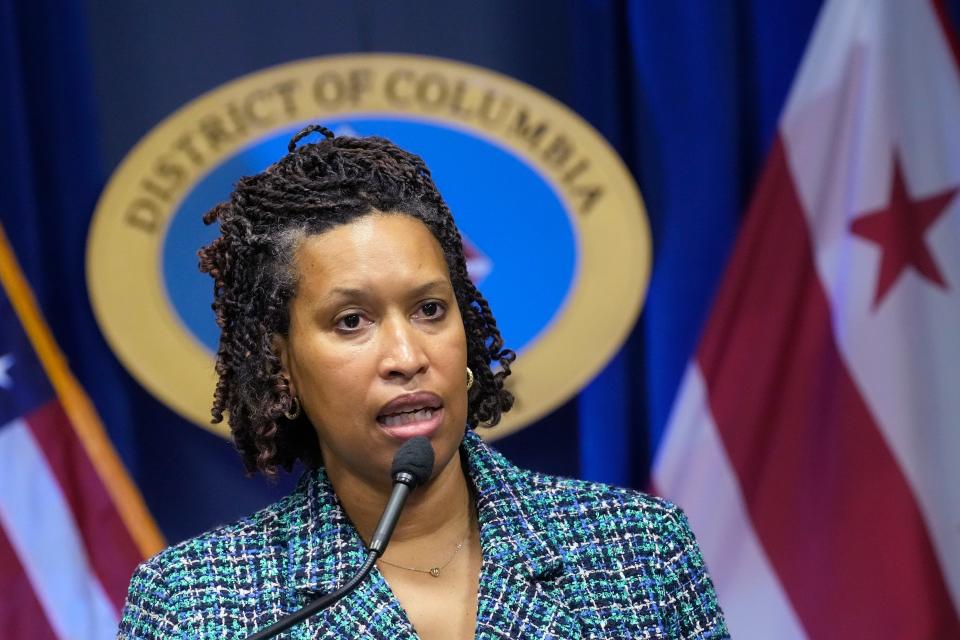Less than four years after George Floyd’s murder sparked a mass awakening to the inequities of the criminal justice system, political leaders across the country are returning to a tough-on-crime approach. In some cases, voters and lawmakers are opting to reverse reforms passed years ago.
San Francisco voted Tuesday in support of two propositions that give more power to police and require addiction treatment as a condition for welfare assistance. D.C. Council members also passed a package of public safety measures Tuesday, including bringing back “drug-free zones.”
The Tuesday votes follow movements to roll back reforms in Louisiana and Oregon.
“It’s a stunning turnabout, especially so soon after the wave of national protests against the system for being too harsh,” says Adam Gelb, President and CEO of the nonpartisan think tank Council on Criminal Justice.
Though the 50-year-pattern of reform and restrictions for may seem like we are headed back to highly punitive policies, Gelb said that isn’t the full picture.
“I think there’s very little chance that we return fully to the notion that we can arrest and punish our way to safety.”
The Excerpt podcast: Crime stats show improvement. Why do so many believe it’s never been worse?
Pendulum swinging across decades led to reforms during last 15 years
Gelb said the pattern like a pendulum swinging between restriction and reform starts as early as the 60s when a wave of reform led into a spike in crime in the 70s. The 80s brought in the crack crisis and a “get tough era,” Gelb said. Over the next three decades, mandatory sentencing, a boom in prison development and harsher drug enforcement tactics led to a ballooning in the prison population.
During this time, the Violent Crime Control and Law Enforcement Act of 1994 was signed by President Bill Clinton, which The Brennan Center for Justice considers one of the most comprehensive federal bills on crime in history with a “complicated” legacy for its contributions to mass incarceration.
By 2007, one of every 31 adults was under the authority of the correctional system in the U.S., the country with the highest per capita incarceration rate in the world, according to a 2010 congressional report.
Efforts to reduce those populations had bipartisan support, as can be seen by the 2018 First Step Act to improve criminal justice outcomes while keeping crime low, which former President Donald Trump signed into law. But even before that, the Pew Trust reported that more than 30 states had passed laws to reduce the prison populations between 2007 and 2017. That included Louisiana.
Louisiana, Oregon repeal previous reforms, critics say ineffective in public safety
In an opinion piece in the Shreveport Times, part of the USA TODAY Network, Louisiana Gov. Jeff Landry explicitly blamed the Louisiana Justice Reinvestment Act signed by the former governor in 2017 for “rampant crime.”
He kicked off a Legislative Special Session on crime, the Plaquemine Post South reported, including pushing through a measure that repealed a law passed in 2017 and now allows courts to prosecute 17-year-olds as young adults.
Landry signed 19 bills into law last week, including expanding methods of execution for the death penalty, reducing opportunities for parole and early release.
House Democratic Caucus Chairman Matthew Willard of New Orleans was critical of some of the moves, saying they will not do anything to stop crime before it happens. The ACLU of Louisiana testified against two of the bills on the grounds they were costly and not likely to reduce crime now.
Similar concerns were raised in Oregon, where the House passed a bill repealing part of Measure 110, a 2020 voter-approved measure to decriminalize drug possession. Critics of the new bill say the state’s criminal justice system is already overwhelmed, and recriminalizing would disproportionally affect Black and Latino Oregonians, the Statesman Journal reported.
Tera Hurst, executive director of the Health Justice Recovery Alliance, also said it would be ineffective in helping alleviate crime rates today.
San Francisco, D.C. expand police powers by ballot and council
San Francisco voters showed great support on Super Tuesday for two measures put on the ballot by Democratic Mayor London Breed. She is up for reelection in November, with her opponents saying she has not been able to manage drug crimes, vandalism and theft, the Associated Press reported.
Proposition E grants police greater agency through less paperwork and wider drone use, according to AP. Propositions F requires adult welfare recipients who use drugs to receive treatment as a condition of receiving benefits, AP said.

D.C. Council members just passed an omnibus bill that brings together several public safety provisions raised over the last year. According to The Washington Post, the Secure D.C. Omnibus Amendment Act includes the following provisions:
-
Judges could more easily order some to be detained while awaiting trial for violent offenses
-
The definition of carjacking expanded to encompass more cases for prosecution
-
“Organized retail theft” considered a new felony
-
Establishing temporary “Drug-free zones”, a 1990s-era tactic revived to address drug-related loitering
Democratic Mayor Muriel Bowser applauded the legislation in a statement Tuesday, saying “We will not tolerate violence and we will not tolerate criminal activity that disrupts our sense of safety and our ability to build thriving neighborhoods.” The bill heads to her desk next before congressional review.
But the bills’ passage drew a mixed reaction from the ACLU.
“While the amended Secure DC Act provides some limited safeguards, it falls short of keeping us safe from abuse of power,” ACLU-D.C. Policy Counsel Melissa Wasser said in a statement.
‘A ratchet, not a pendulum’
While national data on crime rates is notoriously difficult to track, statistics collected and analyzed from cities across the U.S. show a spike of violent offenses and drop in property crime during the pandemic. But that data, compiled by the CCJ, suggests that most types of crime are reverting back towards pre-pandemic levels.
Gelb said the goal should actually be the recent lows in 2014, before the death of Michael Brown in Ferguson, Missouri further ruptured public trust in police.
He also acknowledged that some policies that have popped up recently may be intended to send a message about crime tolerance rather than stop crime directly, noting that downward trends might not necessarily make people feel safe.
“I think this is much more about quality than quantity,” Gelb said. “Most people aren’t fluent in the statistics, but they know what they see and hear on the street, from friends and social media. And it’s the randomness, the brazenness of some of these some of these incidents that suggests a culture of lawlessness, a breakdown of behavioral norms and social standards.”
Gelb also says that even though this wave of tough-on-crime laws may seem like that pendulum is headed back to that era, he doesn’t think it will be that extreme.
“It is a ratchet. It’s not a pendulum,” Gelb said. “They’re not going back to the way it was before. They’re shaving off the most aggressive edges and dialing things back rather than completely rejecting a balanced approach.”
Contributing: John Dupont, Post South; Dianne Lugo, Salem Statesman Journal; Greg Hilburn, Shreveport Times; Joedy McCreary, USA TODAY
This article originally appeared on USA TODAY: From Louisiana to D.C., lawmakers backtrack on criminal justice reform

Amanda Smith is a dedicated U.S. correspondent with a passion for uncovering the stories that shape the nation. With a background in political science, she provides in-depth analysis and insightful commentary on domestic affairs, ensuring readers are well-informed about the latest developments across the United States.







